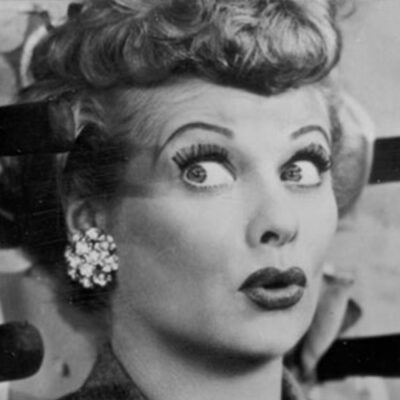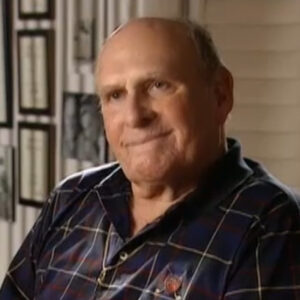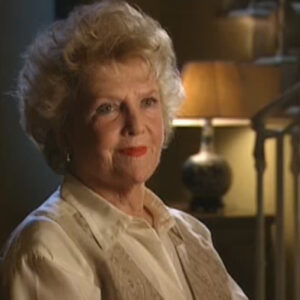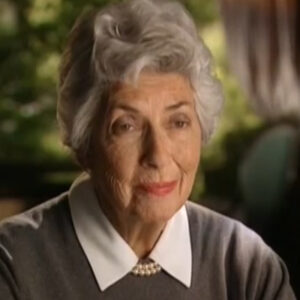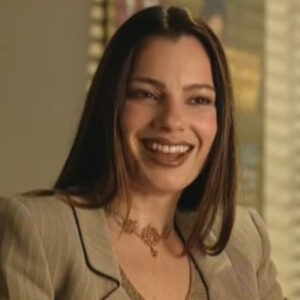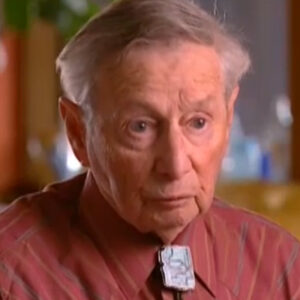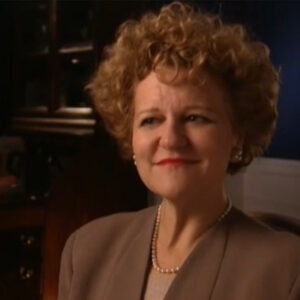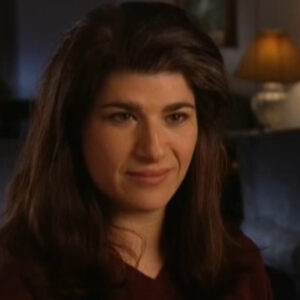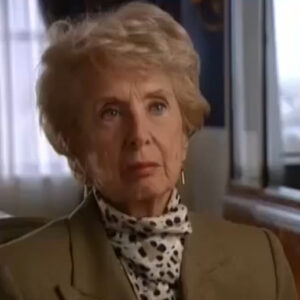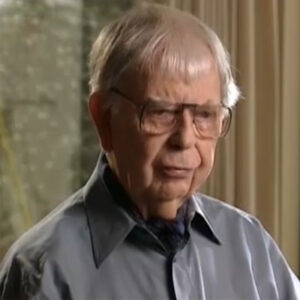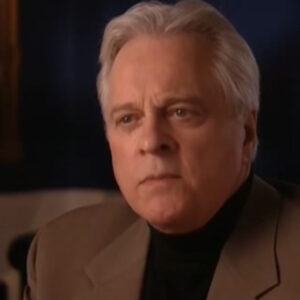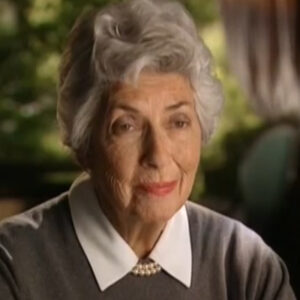Martin Dick: You, came to be cast on the Lucy show and did play Desi Arnaz called me in Reno. Dan and I were playing the nugget up there for Janice Quagga. And he called me and said, Would you do? I’d like you to talk about a part on the Lucy show. Now, mind you, she had been off the air and was coming back on as Lucy Carmichael. And I said, well, yeah, we’ll talk. And, you know, I mean, now. And he sent a plane for me. In those days, there were no there were no jets. He said a piper or a Cessna 310, as I recall. And I flew into Burbank and a car wish me to Desi Little. And I said, well, you know, Stan, I’m working. I have a partner. I can’t do that. He said, well, we could work around your schedule. So I did. And I did. I don’t know. Eleven or thirteen. And a lot of fun. I played Harry Connors, her friend next door, who they envisioned as kind of a boyfriend. You know, Desi said, well, you know, you’re kind of that you you two are trying to get together now and that Europe airline pilots. So you’re always out of town. So I would open each sequence and close it. You know, I would say now I’ve got to go to Pittsburgh. Don’t get in any trouble. And I believe then she and of course, of course, would get stuck to the wall and I would come back and in the last act and say, that’s another fine mess. And I had a ball doing it. It’s because they invented that system, which I subsequently directed many shows and multiple camera. It’s a marvelous system. And I thought the Desi was a hate to use the word genius, but he was very, very bright.
Interviewer: Describe how you see this. Basically, Cuban band leader from nope, not from no place, because he came from a good home in Cuba, but he didn’t come from a show biz TV family, as it were. There was no TV. But how do you think he pulled himself up by his bootstraps to become one of the most powerful producers in Hollywood?
Martin Dick: Well, number one, he was a bandleader. Anyway, you look at it. Oh, I’m sorry. Desi Arnaz was a bandleader and had learned the words to Babalu. So he was very popular. There was an awful lot of me in those days. Cuban. South of the border. Savir Ku got in. And Desi was one of them. And he was very good. He played the New York scene a lot. And he played clubs. And then he he met Lou. I think on too many girls, they were doing a picture together. And she actually did an act with him. They were on the road. And they did an act where she came out of a cello. And it was a. I never did see the act, but it must have been funny. I think they did it. And I love Lucy at one time or another. But they formed the show, just got very hot. And he was very bright to have the smarts to make over the shot over the shoulder shots at the same time you were getting this shot, took a little bit of ingenuity that nobody had ever done that before. And he he just did it beautifully. And then the show snowballed. And when they became so big and they just devoured the studio, you know, they bought RKO. And I just think he was I have a reason to believe that he was almost solely responsible for the success. Not that counting Lou’s great talent as an actress and a comedian, but Desi was the brains he really envisioned. Desi, Lou. He envisioned a an empire, if you will.
Interviewer: Are you hearing the phone. Can you turn it off? OK, Dina must be upstairs. To know what was funny for her. So tell us a little bit. In what way not to take away from her obvious talents and so forth, but in what way was he a little bit of a Pygmalion figure? In what way did he help create this incredible successfully?
Martin Dick: I’m not sure Desi created anything in her. He was the world’s greatest editor, as was Joe Hamilton for Carol Burnett. He they they know what’s right for their spouse in this case. He knew it was funny and what wasn’t funny. It was amazing to me because he really wasn’t schooled in American comedy, really. And he was very funny. He was a marvelous straight man. And he I don’t know where she got the ability, except she had she knew no fear. She was marvelous and a marvelous actress. And you couldn’t do what she did without being a marvelous actress when she made ridiculous things seem almost possible. Now, when the bread came out and pushed her against the wall and stomp on the grapes and veggie vitamins made it all interesting because she was a good actress.
Interviewer: Tell me a little bit about Lucy during the rehearsal process.
Martin Dick: Lucille Ball was a demon for rehearsal. She loved to rehearse and we would get to work. And she also knew the camera’s very well. I had occasion to run in. We would be doing a scene, talking very close, talking like that. And she would just say that camera over there, a camera, A, you’re off your mark. Now, she’s not even looking at him. She’s looking at me. She was. She knew. She knew. And she’d tell him about. She loved to rehearse. Just loved it. Also, I’d always used to own things, but. Me about Lou, is that admission and or the or about yeah, let’s do it again. And I said, well. It’s not a big thing within the there but not all we got to do the words and the words are got to the words now they’d say action and she and Bill would be all over the place. I say in a minute. What about me? I’ve been doing this on stage for all my life, but damn, I never we never had anything written. But she would. She would change things. But you weren’t supposed to. She was a stickler for that.
Speaker Do you have any sense of where this incredible work ethic? I mean, everybody has talked about how she was so no nonsense and there was no messing around. She froze the show at the rehearsal so that there were no surprises. You know, the night of the show, where does this just from your knowledge of her childhood and and her marriage to D.C. and perhaps some of the areas in her life that were less satisfying? Do you think she was somehow running away from something with this incredible work drive?
Martin Dick: I think Lucille Ball had a tremendous work drive, but I don’t think it was that unusual because I also saw it again. And Carol Burnett, I’ve seen it in. She would be off the script. Sooner than anyone in the cast. And it’s I don’t mean it constantly parallels she and Carol Burnett, but they were two ladies married to two men who produced their shows and they both had a amazing work. They loved to rehearse. And what she did, what she brought to it was, I guess, a. I don’t see anything in her background because I didn’t know her then. I knew her very early on. And I love for some reason or other. I met her earlier than I Love Lucy. But I really didn’t know her background. I knew her mother very well, Deedee. And but I don’t know where that work ethic came from. But I don’t think it was that unusual. An awful lot of gypsies. That’s the the dancing world on Broadway. The Bob Bob forces of the world love to rehearse. Oh, they couldn’t wait to rehearse. And it’s because it was a camaraderie and that, hey, you know what we’re gonna do? We’re going to rehearse today. You know, I never like to rehearse at all, but they had that. And she basically, although she wasn’t a dancer, was very aligned to gypsies, to the dancers of the of the world. And Carol wasn’t a dancer either. That’s very funny. But I would like to someday draw a parallel with Gwen Verden or somebody that grew up that way with that discipline, because Lou had it and so did Carol.
Interviewer: Stop for a second. Take a sip of water. Dina, come back. I think there’s a misunderstanding on the part of the public that, my God, she was that she was just like Lucy Ricardo in her real life, that she must be because how could anyone be faking that, putting that on? Tell us a little bit about the contrast between the zany character and the real one.
Martin Dick: Lucille Ball was the opposite, the antithesis of Zany. She was very straight down the line proper. There was very little humor. No, she was not. She was not a funny lady. She just knew how to do it in front of the camera. Better than anyone. But she wasn’t she. Her home life was not funny at all. It was. You know, I was around when Desi was drinking. And it was not a happy home life, just a happy Cuban. We. And she couldn’t share in that at all. It kind of sad, but. And then afterwards, what she married Gary, which lasted many more years than she’s marriage. She and Gary, there was still. Not a great deal of humor. I don’t know how to explain.
Interviewer: Can you think of an example in a home situation where somebody else at a dinner party is playing the role of a clown and she’s.
Martin Dick: Oh, gosh, many, many people in the in the in whatever room she was in. And she was a great audience laugh. Oh, she loved that. But she herself was not. She loved games. She played games constantly, scrabble, canasta, anything. She loved games when they when they backgammon craze came in. Oh, my gosh. She joined the clubs and went and played backgammon. She loved games. But that always has been to me someone who does not want to be involved in the overall picture. So let’s concentrate on the game and they can do that very well. But no, I didn’t see a whole great deal of humor. And Gary was a comedian and he was fun and and he she loved his humor, but up to a point when it became business or anything. There was a cut off there. Lou, she took care of the after Desi, she ran that place and she ran it with an iron fist. And she ran it and well.
Interviewer: And do you think that somehow when you’re thrust into that role of being the boss, inevitably you’re going to make enemies? Are you going to have to make the tough decisions that people will resent?
Martin Dick: I believe that anyone who had to assume the role that Lucille Ball assumed after Desi would have to be hard as nails. There’s no other way they could run that big an empire that is still going on today. Darn near as big as it was then. There is more Lucy memorabilia and happenings. I don’t I don’t know any other star. I always assumed Clark Gable would be forever. There are people today don’t even remember his name, Lucy. And there are many Frank Sinatra. I always thought that Bing Crosby would be forever. They don’t know people who know him today. They know Frank Sinatra. Go figure out when I was growing up, there was no one bigger than Bing Crosby. That’s amazing. But Lou Lou perpetuated that and became one of the best business persons in town. And I guess you have to be a little a little crusty.
Interviewer: She once said, I’m not funny. My writers are funny and brave. That’s very wise. Tell us a little bit about what you think she meant by that. And some of the situations, the brave situations her writers thrust into?
Martin Dick: Lucille Ball did more crazy things on television in front of a camera than anyone I can think of. And she had no idea what she was doing. I was had been there a couple of times when she had to be on stilts one time and one time when she was on a trampoline. And all you saw was her head popping up out of frame now and then with its day care. What you say she just took to it. And by Bob and Madeline, the writers would think of these outrageous things. And she would she wouldn’t even. The only time I saw Backed-up was in the elephant sequence when she. I think she had was working. I don’t wear shoes working at the bank or at cashed check. She had five hundred dollar bills. She had to take him from A to B.. And lost them. And one of them, she tracked them all down but one. And she found it at the circus. And it was under the elephant’s foot. And so it was she looked at that elephant first day that was there in rehearsal and she said, oh, you you’ve gone too far. Now, I am not getting near that thing. And I had just worked with an elephant for, oh, five, 10 times at the Nuggets Sparks. And I just walked up that trunk up like that. But it went up like that and she thought I’d come from Mars. How do you. You can’t. And I I brought her over and she petted the elephant. And then she did the scene. But that’s the only time I ever saw her backup. But she did think of the things she’s done. And she had to be so brave. But somebody had to think of it. She could never think of of that. That wasn’t her fault. She wasn’t that funny that way. That’s why she was a great respecter of writers.
Interviewer: Tell us about some of the I Love Lucy crazy, you know, climaxes that these writers thought for her.
Martin Dick: I remember a lot of the Lucille Ball third act because that’s what they would do. They would write a funny we do the same thing. You write a funny happening and then work backwards. How you got there. And I think that the vitamin thing was really red Skelton’s guzzlers Jim. Any way you look at it and as she did, that’s she that’s so well. But that’s all the writers had to think. Let’s see, how can we have our ha guzzlers Jim, gets. That was easy. And they’re stomping on the grapes. The. Oh, I can’t think. I, I don’t know how many I Love Lucy shows. There were. I think there were there had to be two or three hundred underneath. Oh my goodness gracious. 180. I Love Lucy and every one of them had a marvelous third act. And that’s that’s the way most writers I’m not saying they they did it is you get a third act, then work backwards. You get a joke. I give you an example. Dan and I had one. Get this. It’s coming in. Do do do do do do do do do do do do do do do do do. Did you get it. Yeah. What did they say. Doo doo doo doo doo doo doo doo doo. And we went and then we got once we got that joke then we worked backwards and did a spy bit that we did forever. About two guys meeting and you knew you had this at the end. So it didn’t matter what you said before. And that’s what the writers did on many shows. And I think a lot on Lucy because they had such marvelous third acts.
Interviewer: The feeling, I think these days TV is shot in a very different way than in the earlier days. And from what I can understand, talking to the director and so on, they really tried to run it like a show, like a play. And there’s a lot of pressure that goes with that. You don’t want to screw up the camera, guys don’t want to screw up. Tell us a little bit about the rush that you get as a performer walking into that fairly charged situation.
Martin Dick: I’ll tell you the the what Desi envisioned, the multiple camera. It was always three camera film. In those days and therefore it had to be edited and. But it was very much like doing a one act play, really a a 22 minute play. And it’s exciting. And the the the reaction you get from the audience is, is what sparks an awful lot of performers, including Lucy. You know, nobody had ever done that before. You always shot at single camera and then you edited it together and then put the oh, that awful laugh track to it. Well, they didn’t have that in those days. And and we did an awful lot of Roland Martin did a lot of live television in those days. Ed Sullivan. Everything was live. So you got that spark. And Lucy loved that that audience. She she loved to go out there and rarely had to do it again today. They and they have four cameras today. And they I don’t know. They they don’t know. They don’t know what they want. They don’t have a Desi Arnaz. They don’t have a Bob and Madeleine. They wrote it. There was no 18000 writers and 16 producers like there are today. They did it and she liked their work and interpreted their work. And that was it. And so there was an awful lot of retakes and pickups, as they call them today.
Interviewer: But tell me just from your own perspective. We scared. I mean, you must have felt nervous going out and, you know, you’re going out there that enough?
Martin Dick: That’s true. I happen to love walking on stage because that’s what I did long before television is Dan and I would play nightclubs and nightclubs are full of drunks. And if you ask if you can please them and get their attention. You don’t got to worry about a studio audience that’s just been let in off the bus. So I loved an audience and I loved that. You are, incidentally, allowed a lot of people don’t have Lucille Ball’s Joie de Vee in front of a camera. I once did a show with Joan Crawford. We got a part on that Tim Conway show. Dan did one week and I did the next. He got Lana Turner. I got Joan Crawford now. Whereas where we are, were you gonna meet Joan Crawford, for heaven’s sakes? You were a big star. I don’t believe I’ve ever seen such terror. Oh, my God. She was just she had never, ever been in front of an audience. All those years at Metro-Goldwyn-Mayer were we can’t cameramen. If you’d be she was the we had a scene where we had to dance and she was shakingly. And so Lucy also had she must have had some training that I don’t know about in order to do the nightclub back with Desi, some training because she walked out there and she they they played big theaters radio show, which was done before a live audience. And some people think that a radio show would help you with Dick Dening, as I recall. And. But the radio show can help. It can help you. Exactly. And I’m amazed that some people were just terrified of the microphone. Now that you came see the people. But just the being in front of a microphone was terrifying. But, yeah, Lucy did. They had a live audience, but I’m not sure that would prepare you to play in front of 2000 people in a proscenium where there’s an orchestra behind you and four acts ahead of you. I know. I don’t know. She somehow she could do that and did it well. And then she, of course, loved it. He loved to be out there with the with a conga drum. And that was that was fun for him. Some people adore it.
Interviewer: But you do. So tell me why you love it. What does it do?
Martin Dick: I was. I wonder why I like it so much. I mean, there are people that just can’t wait to get out state. My partner never really liked the business. As a matter of fact. And he was as good as it ever got. Dan Roone as it was, is good. That’s great, man. And the people that have told me that were Dean Martin, Groucho Marx once told me that. And George Burns is your partner is so because he he had he was smarter than most straight men, you know. But Abbott was a lovely man. We couldn’t add two and two. Dan was a very, very professorial and very well read guy so that he could enter areas that these other guys couldn’t do. And they all envied Dan, but he never liked it. I loved it. Go figure. I walked out on stage and I was like an. I was I was having such fun. And then I would not say the same thing. We are act was once described by the stage manager of the Palladium Theatre in London, where everything is quite proper. And he once said, after we were there about a week and a half, he said, It occurs to me, gentlemen, that you have a frightfully elastic script. Well, you weren’t used to people changing while while you’re working. And I used to I loved to break down. It wasn’t easy to do, but I could do it. I had a ball out there. I was having fun. I miss that. I really miss it’s the only thing I miss in show business is I really miss the nightclubs.
Interviewer: Stop for a second. Take a sip. Are you feeling the sun and is it all right? All right, fine. All right, keep rolling. I couldn’t help but feeling when I walked into your Dan and looked at the photos on the wall, hey, I couldn’t help but think when I looked in your Dan at these photographs, you with the wig. This amazing smile on your face. You really look like you’re having so much fun. And I just want you to tell me a little bit about the perks in the business of being someone who provides laughter for millions. Because you must somehow get pleasure.
Martin Dick: I get a lot of pleasure from from entertaining. I wish I were an entertainer myself, but I never was. I’m an entertainer through a team. So it’s it’s not the same. A little bit. But I love to have a laughs and fun. And that’s I guess why I surround myself and weed out everyone who is not fun. So I my group that I would be that I am around an awful lot would be Tim Conway, Bob Newhart, Steve Lawrence, the fund, my conures, the cremin. We have laughs and I have fun doing that. And maybe one of the perks is I wonder, I, I miss walking out onstage. Bob Hope once said we’re going to play the London Palladium for the first time in 1957. And he said, walking out to the microphone at the Lennon played him. It’s like walking uphill. He said, you just get so high because the people are screaming and you did. And that’s the way Bob always thought. He couldn’t wait to get out. Hi there. And that’s the way I felt every time I walked out on stage.
Interviewer: And then I’m I to ask you to take that to lose the obviously, you’re going to have to speculate because you weren’t inside her head.But do you think she took pleasure out of making millions of people laugh?
Martin Dick: I think yes. Lucy had a great deal of pleasure out of that. I was around her a lot when she was doing Wildcat. And we would go out to dinner a lot. And after the show and she I, I took her to a place called Danny’s Hideaway. I remember. And she had a friend, Jane Keane, who became sisters. Jane was weather. And we went to Danny’s hideaway. And there must have been I had been 300 people outside at Forty Fourth Street. I believe that was the theater. And she had to wade her way through that into Mike. I had a car and we whisked off and that was everywhere she went. She was something else much bigger than life. And I wonder I’ve often wondered whether she enjoyed it as much as some people do. She. I remember that she we got to the restaurant and they took pictures. And a week later, there were pictures all over the restaurant of Lucy and myself and Jane. And she liked that. Yes, I think so. I think she liked that. But I wonder and I wonder if the celebrity was enjoyed as much by her as, for instance, Hope Bob Hope came away. He once said the difference between the reason people don’t touch me and they never touched Bob Hope. They never touched. Clark Gable because they walked through with their head high and waved and talked to the people as they were going. Hi there. Nice to see you. Glad to see you. Hello there. And they go. He said that Frank Sinatra goes like this and they judge a jump all over. You don’t do that. You’ve got to go through like this. I once saw Gable walk through a crowd and they parted. I saw I never saw that before. And they didn’t know. Nobody ever called him Clark. Mr. Gable, how are you? There were some some Deery about him, and that was when did he counted? You know, you can’t see Al Pacino walking through a crowd that is not the same picture, but I. Lucy. Lucy enjoyed making people laugh. And. And we did a special with her when she had on. Let’s see who was on. It was Dinah Shore show. That’s right. Like Hepp was called. And we did the show and three of our our childhood. She was big movie fan. So we had a sketch where we worked with a Leisha Cook Junior. There were three old time villains, Peter Laury, right out of the Maltese Falcon. She loved that because they were they were they were her. That’s where she loved the movies. And she had a projection room. And we see movies there at the house and Roxbury. But she loved show business. She really did. But I don’t think it was the same with movies or that it’s hard to love movies. Because you’re not doing anything.
Interviewer: Well, it’s interesting because somebody in New York who was a young man in the 50s, part of the Desilu workshop, which was a group of young actors, she tried to create a contract stable for a while at it was a nice idea. It was Carol Cook was a member of that. Actually, Carol hung out a lot with Lucy at that period and then I guess continue to know her through the 70s. And he felt that what she really wanted to be was a movie star more than anything, and that she thought her moment had arrived when she got the part of me and that here she was going to win an Academy Award. She was sure of it. And it was quite devastating.
Martin Dick: Yes, it’s true. Lucy really wanted to be a movie star. There’s no question about that. And and she was a marvelous actress who go back to the Henry Fonda things before I Love Lucy. And you see a very good actress. But movie star is a different thing than an actress. And she wanted to when she got Mame, I thought what a terrible piece of casting because she wasn’t that she wasn’t Mame and she couldn’t she couldn’t do that. And I don’t know. I think that she had that one shot. And I’m not sure she had another shot at being a movie star. I can’t think of one. They never did Wildcat for a movie. And she shouldn’t have done a musical anyway because that wasn’t her. That’s wasn’t what she did if she did on a great comedy. If had gotten a great comedy, but nobody would give her that because she was Lucy. And I remember when he was Michael Kid who directed Wildcat and there was no references to Lucy in Wildcat. And she let that go for about a month. A one time she said she had an exit or something, and she said, well, I’m leaving. I’m going up and see Fred and Ethel and the people exploded. They did, because now there’s Lucy. Up until then, it was a wildcat. But she. She threw it about five or six references after that. And I told Michael Kidd. I’ll direct this part of it. But she was strong. But she was right.. Why else was she there?
Interviewer: But there’s also something so poignant about being the most popular entertainer with the most popular character. And then on some level, you’re trapped. Yes, I’m in the audience. Won’t accept you.
Martin Dick: No, no. Very few people. Jackie Gleason stepped out momentarily from his persona in The Hustler. And a couple of things. Most comedians or comediennes, they no one would take them seriously if they’ve ever have an indelible mark. Dean Martin was very lucky. He he had such a persona that to get out of that persona was almost impossible. They only did it two or three times. He did it in toys in the attic. And he did it. And the young lions. But mostly he had to play that part. And Lucy had to play that part. If they’d have written something like that for her, for a movie, maybe. But comedies rarely, rarely get accolades or awards. You have to kill some people or go crazy. Then you’re then you’ll get awards.
Interviewer: But do you think that she felt trapped?
Martin Dick: I think I believe Lucille Ball felt trapped. As Lucy because there was nothing. You can’t get that big and that identifiable and try to break out of it. You can’t do it. There is no way. And I don’t I I’m sure it was a kind of a drag to her, but there is absolutely nothing she could have done about it.
Interviewer: So how did she feel?
Martin Dick: Lucy filled her later days. She didn’t go. She went to the Springs some because Gary loved to play golf. But as Lucy loved this ski country more than anything, she. But nobody’d go whether she never had pals. I believe Lucy, where she, you know, 50s today would have a lot more fun because a lot of people that she knew would be up in Aspen and she just loved that. And she just nobody would go and fly. She. Gary, wonderful springs and play golf. And she played golf. I mean, played games with Eva and and Deedee and the gang around. She’d have three, four girls and they’d play games made sit in the living room. And they’d won movies at night. I don’t know whether that was shouldn’t travel much. She was just too well known. That must have been a drag, too, you know, because she she couldn’t take an ocean voyage or a cruise for its and would been impossible for Lucy. She’s just too big. People can’t help themselves but wanting to go up. That’s another thing. The difference between a movie star of the 30s, 40s and 50s were were bigger than life. When you went on TV, you became one of the gang. Hey, Lucy. Hey, Dino. Jackie Gleason. Phil. So a fairly they TV personalities where they came in your living room and they were a part of your life. But Mr. Gable would walk with that’s another thing. And that’s Lucy was always Lucy. And they loved her. She couldn’t go anywhere.
Interviewer: You said a moment ago she didn’t have pals. Why not?
Martin Dick: I wonder, I don’t know why Lucy didn’t have a lot of. But I. I know an awful lot of girls like that. And a few guys that don’t have pals. I don’t know why. I don’t know. They’re busy having their family or their career or something. And they just never, never had time. They never learned that part of life about hanging out. Nightclub people always hung out and vaudeville people always hung out. They will all hang out. But TV people, you will get to see people that often. And she was very she got. She worked hard. She worked hard all her life. And it it it certainly paid off. But I think it cheated her a little bit out of having a lot of friends.
Interviewer: And how about her family?
Martin Dick: Well, she had to one. Lucy had two wonderful kids who who I watched grow up. And I remember when Darcy got his first set of drums out in a room out back on the set of drums, and they both got on to do. They’re both very talented, nice, nice people that kids grow up and leave. It has always been my philosophy that the only thing that is constant is friend. Husbands and wives split up. Couple of them die. The children grow up, get married and gone. Friends, family, friends that way. Bob Newhart and I have been friends for 50 years, and we still see each other once a week. A hour. And no pressure ever. But she never had that ever. And Desi was a not. Well, they had different friends. That’s the problem. And they didn’t entertain much, as I recall. I don’t recall parties. Funny, the first time I met Lucy was at a party in Chatsworth where she and that he had a very charming ranch style house. I have no clue why I was there. I must have known somebody that took me there. A boy. I don’t know. But it was a delightful party. But I don’t recall any parties at Roxbury. I used to go in and sit in the library, wait for Gary while he got ready, and we’d go out and play golf and Lou would be over in the corner playing Scrabble. There were never people around the house. That I was there a lot, but I never saw. I stayed there for a while. A lovely guest house up there. And I was between I was coming in from somewhere and going somewhere. And I have no play. You stay here. So I stayed. And they had a wonderful cook. I can’t think of her name now. Much like the one at Tara Scarlett O’Hara had, and she was such fun. But that’s nothing. Lucy never cooked. She slept a lot of stars. Suzanne Flechette keeps your sweaters in the oven. She’s never, ever. It’s never been in the kitchen. But that’s fun. But Lucy, never she never knew about the fun of going in and making something. Hey, I know what we’ll do. We’ll cook. Never did that. That was part of her. I guess I’m thinking, as I think back, that her life must have been mostly apartment dwelling in the early days of radio back in those days. So I don’t think and a lot of hustling you had to get out and Arsenal, you had to go here, you had to go here, you got to go there. And you had to go for interviews one after the other. It wasn’t like. So maybe she just never got the love of cooking and that sort of thing. She wasn’t a drinker. Really didn’t care about wine. But I don’t I I don’t know what I’d do if I didn’t have the kitchen. I love the kitchen. And that takes up a lot of my time and fun and a while. No way I’m serving tonight. Come on. And we’ll have eight people here. But if it’s mainly to have fun.
Interviewer: You mentioned Desi and going to Chatsworth. It seems like from what people have told us, that in some ways they had more fun together as a couple. I know he was on the road a lot, but they’re together time in Chatsworth before the show with some of their better moments together as a couple. Can you describe their relationship?
Martin Dick: I thought that when I first met Lucy and Desi, I didn’t know who Desi was because there was no television. Don’t forget. You didn’t see Ed Sullivan. So I knew he was. I had an orchestra. That’s all they knew. And they were they seemed like a couple of kids out in Chatsworth. They were having such laugh, some fun, and they were together a lot. And when the children were little, I remember them playing in the desie in the pool with with the kids all the time. He was always like that and they were happier. I think they were happier before they became stars. I think that that grind got to them and. And that’s he had a problem. You know, only a prank. And I remember we played the chichi in Palm Springs, another place that’s gone and many years ago. And the people who went to Palm Springs would come in and see us. And nobody did second show business because everyone wanted to get up and get the sun. But I remember Jack Benny coming in and we were so thrilled. My goodness gracious, giant and easier with Govan’s and sat with him, had our pictures taken. That was fun. And Jesse was always there late. You figured he’s not home and he’s drinking and. And I think he’d like ladies. And it was not a pleasant thing, I guess, for Lou. But I never saw that in the early days. I don’t know. Success may have have kind of dampened their dream. I don’t know.
Interviewer: Well, we’re not privy to what went on between them. Everybody is so willing to kind of blame DeSean. Come on. Come on. Let’s face it. There’s two sides to every story. Maybe her professionalism made her not available to her.
Martin Dick: I think something happened between Chatsworth and Roxbury other than Darcy chasing ladies that had it been something that we’ll never know. And it’s none of our business that what was between them. And it wasn’t it wasn’t happy. It certainly wasn’t happy because I never saw. I don’t know. She had great respect for him, incidentally. This is long after they were divorced. As a matter of fact, that he was there on the Lucy show. He was there for the first I guess he was there while I was there, the first 13 shows as executive producer. And that’s when I got to know how good he was. But there was no you know, I can’t. There was no closeness or anything. But I did see closeness in Chatsworth.
Interviewer: And is it your sense after the divorce that she still had her regret, that she somehow couldn’t make that marriage work?
Martin Dick: I believe that she had one love and that was Desi. And I think she regretted it forever, that it didn’t work. And I don’t know how much she blamed Jesse or herself or the business or whatever. But I think she really I I think she really loved Jesse. There was a look I don’t know. There was a lot. And they were as I say, I saw them a just a couple of three occasions where they were so happy. They were so happy. And that’s and that’s even after the children. So they were there. Weren’t the children born on the show? I mean, little Desi. So they had to be there to be during the show. Yeah, but he was still around a lot. And and love. Love playing with the kids. Yes. That’s it’s it’s it’s I I used to feel a little sad for her because I can tell. I can tell this story now because both people have rolled a seven. And they’re gone. But one time when Lou was single. And Dan Rowan. Was single, he had a an apartment somewhere near Crescent Heights and sunset around there somewhere. And we had well, and he was living in a bachelor place. And Lou was single. And they were talking one time at a party or something. We are we were at the crescendo on Sunset Boulevard appearing there. And she brought Walter Winchell in because Walter was doing the narration on The Untouchables. And they were quite close. And we were we had been discovered by Walter. So he was happy to come in. And so it was a couple of days later and Lou told me about this. She and tell me about this for about a year, two years or something. But she were talking about they were talking about daiquiris or something. And so what she did was she got she got a blender. And the bottle of rum and some lemon juice. And she took it over to Dan’s apartment. And Dan. They were having and I’m sure that she probably thought maybe there was a spark there, this was long before Gary and then maybe, who knows, they could have been a romance. I don’t know. But he was so down, you know, we’re not making it and we’re not doing well. And nobody wants Roland Martin. And we just. And she got so that moment that she finally left the blender, the rum, and said good night to him and left him there because what had started, what she had thought would be a wonderful fun evening turned into his problems on her shoulders, who had enough problems of her own and looking to escape problems. And and she just left and thought, oh. And she’s home. And I said then was kind of that way. He was not what you call a buster bright. Not really. But he was a lovely guy and a very big talent. But he just he saw that the glass was always half empty. The daiquiri glasses, I recall.
Interviewer: Well, it’s interesting that you mentioned Walter Winchell, and I’m shocked to hear that Lucy was palling around with him after what he did to her.
Martin Dick: Now, what era are we talking about?
Interviewer: That was 1953 when she had won the Emmy Award at the end of the second season of the show. She’d just been renewed for eight million dollars with Philip Morris and she was literally the top comedienne. And in September, over Labor Day weekend.
Martin Dick: 53?
Interviewer: In 53, over Labor Day weekend, he went on the air saying that television’s top comedienne was a communist.
Martin Dick: Yes. Well, this has to be many years later than because this is when they hired him to do the voice, the voice over on The Untouchables, that was a Desilu production. So water under the bridge, I guess. I don’t know. But she was actually babbling. Usually they they came in together and left together.
Interviewer: Do yoou remember this. UAC incident. How did.
Martin Dick: Oh, yes.
Interviewer: Can you tell us your memories?
Martin Dick: Oh, no. My only memory is from the newspapers. And I thought if at the time was the same thing, I thought if if if if Lucille Ball.
Interviewer: Let me stop. Tell me again. I can remember the day that I opened the newspaper and read the headlines and what it said.
Martin Dick: I can remember opening the paper and reading the headlines that said Lucille Ball is a communist. And I thought, if that is our biggest fear in this country, that Lucille Ball is suddenly going to turn on us and overthrow this government along with maybe Larry Parks will be with her. And I thought this is most ridiculous thing I’ve ever heard. But it was Walter Winchell was a a pawn, a very good friend of J. Edgar Hoover. And when Joe McCarthy was going to run for senator up north. He said, I need a gimmick. I need something. He didn’t know squat about communism and J. Edgar Hoover. This is all documented. Gave him that guy candidate kind of pinkos, Pinkel. That’ll do it. And he got elected and then he swept with that and swept up some marvelously talented, lovely people. And. And I’m surprised that not one person stood up and said, oh, it. Lucille Ball is going to attack us. Come on. And and they were looking for any scrap, any scrap, you know, that there used to be a a meeting place behind Schwab’s. I was there. It was called the little red schoolhouse. And they would have talks about communism. And I didn’t care. All I knew is you’ve got a free cup of coffee and a doughnut. And we sat there with laughs. I can remember a lot of people being there, but they weren’t communists. They didn’t care. This was a philosophy that was silly. But but Walter Winchell was all part of that. He was he was not the nicest man ever, but he was very nice to us. And but in the end, as I say, he came in with Lucy.
Interviewer: So why do you think that despite their best efforts to bring her down or promote their own careers in her? Why do you think it didn’t work?
Martin Dick: I wonder.
Interviewer: Alot of peoples careers were ruined. That’s the thing we forget.
Martin Dick: Yeah. But that where the careers were ruined. And because of that era, there are some things that happened that that are just sandwiched in a certain timeframe that it couldn’t possibly have happened before or after. There’s no way that could happen. But there was a time that this country was was in a panic. And I can’t understand how it happened. But then you have to think about how do people accept as their leader ad of Hitler. But they did. And I don’t think that could happen today. But it’s it’s had its time, and I I can’t imagine what Lou must have done to get this. She must have signed her name to something. And. And there are an awful lot of causes in those days that were, well, liberal. Now, I don’t know too many people less political than Lucille Ball. She didn’t care, but I’m sure if somebody said, hey, there’s people starving and we signed this petition. Sure. And everyone did that. And that’s the straw that these people clutched at the Joe McCarthys of the world. And there were a lot of them. There are. I remember when they hypocrisy because I remember pointing this out that Estos Keefe offer that QIf offer committee was going around the country and about gambling and Frank Costello and all the biggest gambling place in the world. Tennessee is home state. And what they they they made a name for themselves.
Interviewer: So why do you think it didn’t bring her down?
Martin Dick: Well, I think people I believe people woke up and finally said, this is balderdash. I mean, Lucille Ball is not they they I think they picked the wrong person. Maybe if they’d have picked someone down and not. Lucy, are you. How could she be a communist? She’s got purple feet. When the grapes and she can. It’s just silly. And I think people finally just said that this is just silly and they couldn’t make it stick. They could. They they made it stick with Larry Parks, which was the saddest thing you ever saw in your life. A man’s career destroyed. His life destroyed. And they don’t care. They made a name. But Lucy. Lucy was. I don’t think Didi had signed her name to something that her mother. I can’t remember.
Interviewer: She actually signed a voter registration card for her grandfather, saying he asked her to do it, registered to vote, and then did not vote, but said she was registering as a communist.
Martin Dick: Yeah, and I’m sure she couldn’t spell communist. So there was just it was a silly era in our life in America that that kind of thing could happen, that you could fear that Lucille Ball was going to run over that hill to attack America. That was silly, but nobody said that’s silly. I don’t understand why people say that, because they were all afraid. They were all terrified.
Interviewer: Except in her story. Desi really did come to the rescue and he did say.
Martin Dick: Did he? I’m glad.
Interviewer: In front of the studio audience that night. He got up and made this amazing speech from from what people have told us.
Martin Dick: Oh, I love it. And he would, too. Good for him. That’s nice to hear.
Interviewer: I just have a few more areas that we haven’t covered, this has been delightful. I hope that you’re still all right. Tell us a little bit about the relationship between Ethel and Lucy. Now, you had talked to me, mentioned to me that in a way, it was a Laurel and Hardy kind of a relation of words and that there were. Let me just put the whole kind of picture for you. Certains CBS executives thought the show wouldn’t fly without the men. And then they would you know, no one wanted to see these two girls together. And in fact, that turned out to be quite not the case. And tell us a little bit about that and how you factored into that and then factor it back out.
Martin Dick: Well, I guess I was hired by Desi. I don’t know whether CBS suggested that or why, but as kind of a male, they didn’t want to go as far as is we’re going to gather or we’re gay. They didn’t go that far. But so they had me as a pilot. And after just about four or five scripts, I started pointing out how many times that their dialogue was lifted right out of Laurel and Hardy movie. And Bob Carroll was the major major Laurel and Hardy fan. In other words, you got two people together and one of them says, why don’t we turn the basement into a rec room? That’s a good idea, Lucy. We’ll go down to the hardware. That doesn’t sound like Laurel and Hardy. That’s what they said every week. Why don’t we? It was always a conspiracy thing that she and Ethel would would go to do something together. And. And we will we’ll leave the kids and we’ll do. And when there’s a cold delivery today. So we have to be kept. But it was always that marvelous. And then sure enough that it it grew and grew and that they were Laurel and Hardy and Jackie Gleason and and and Art Carney were doing Laurel and Hardy. All of this with art. That was all done. Bye bye. Oliver Hardy, many years ago. And there but that’s how strong the influence was. And it made them a team and it made Ethel and Lucy a team. I never saw. I don’t. I never saw him hang out together. I never saw that, so I don’t know how friendly or they were off screen. They were friends, I guess. But as I say, Lou didn’t hang out with anyone.
Interviewer: But tell me about how this notion that people underestimated the female female relationship in the first show.
Martin Dick: It wasn’t female female. And as much as it was two conspirators, it didn’t matter whether they were male or female then matter. It’s the fun part of it is two conspirators going to do something. They screw it up and still are friends and go on to another adventure. And they did this every week and it was marvelous to watch, but it was Laurel and Hardy. So it wasn’t really a feminine thing or a masculine thing was just something that happened. And I suspect Bob Carol. I think he knew what he was doing, because you watch that first thing that you’ve got to do is to give two people a reason to be together. And their reason is they were saving rent. One of them owned the house so she’d rent the rent. And they both had kids and they’d play together. That’s the reason to be together. But that’s not funny. So now you got to get them. So now you got to get her do things that are ordinary, but they just never work. And and they almost took all the stuff that I Love Lucy. And that idea, only the two of them were doing it. That never was a conspirator. Vivian was a conspirator and that was what was funny.
Interviewer: So how did your character fit into this duo?
Martin Dick: Well, mine was a bookend and I came in and said, I’ve got to go. But now, for God sakes, girls, remember that the Cole is being delivered. So don’t be down in the basement. You have to go. And I’d leave and then I’d come back and there’s Lucy Viv up to here and Cole. That was a funny day. And so then we had to get get him in there and then place Cole around them. And there’s that is a funny sight. And I walk in and just put my foot up on the Cole said, well, yeah, did it again. And that was my part. But somebody had to bookend those things. And that was me. I don’t know who did it after me. I guess it was Gail Gordon.
Interviewer: But why do you think that your character didn’t continue?
Martin Dick: Because they didn’t need me. Oh, I could tell that. I could tell they didn’t need that at the beginning.
Interviewer: Can you start that at th beginning? My didn’t continue because.
Martin Dick: My character didn’t continue because they didn’t need me anymore. They had found the relationship that they didn’t know. They didn’t know Vivien and Lou were going to be these coconspirator. They didn’t know they were gonna be Laurel and Hardy. I think they were just gonna be roommates and see where it went from there. But after 13 shows, they didn’t need me anymore. And I already had a job. So I was said goodbye very gratefully. But they they didn’t need anybody. They didn’t hire anyone to replace me because they didn’t. They didn’t need it. They found there they found their nugget that they needed with the two of them. That’s very hard to find, incidentally, if you find that you can run for years.
Interviewer: This has been a really wonderful interview. Is there anything else that anybody else wants to ask? I was curious about one thing that we’ve heard so much about. You know, I heard you telling the most wealthy person in a prosperous. So what did she do with their excess money that she collects? Artists should give it away or whatever. What if and if you would address Panov? I mean, it is true when she first of all, she was the highest paid woman in television when she in D.C. got renewed in 53. But then when she sold Desi Lou studios in sixty seven or eight Paramount Gulf and Western, she was then the highest paid woman in Hollywood, not just TV movie studio. So it’s fair to say that she did break some records in that earning capacity department. So tell us.
Martin Dick: I would say Lucy had money from early on because as long as I knew Lucy, she’d never spend anything. In other words, she had a very modest home in Palm Springs at Thunderbird. She had a very nice home, which they paid ninety thousand. She told me one time. Can you imagine buying the corner of Lexington and Roxbury for ninety thousand dollars? Boggles the mind. And. But other than that, she never, ever spent money. She was the antithesis of Frank Sinatra. She must have been terribly, terribly wealthy when she died because she didn’t go anywhere, she can do anything. And she didn’t entertain. She didn’t have a lot of servants. She had no golfers. She had no interest in cars. I don’t know. It would be nice. That should be part of this story. Dig into that a little and find out what happened to all that money. I wonder. I don’t know. I think she was a charitable person. I know her charities. She was one of the if not founders, one of the original share, a charitable group in Hollywood. And I’m sure her charities were very good. But she wasn’t an art collector. To my knowledge, I never saw great art. And, you know, they had a very nice home. But the minute the guy bought it, he leveled it and build another house. So it was not lavish. And you think of the people today, my goodness, you drive up the PCH here and you see the home jutting out that Scherrer is building. Now, Sharon never made that kind of money in her life. And she’s building a home there, that whole boy is a lot of money. But Lou doesn’t have that. She never wanted to come down and get a beach house. She never hotspring, was it? She went to Vegas only occasionally, didn’t gamble really.So you wonder she had no but really bad habits.
Interviewer: Well, one person told us that she had this habit when she was the president of D.C. Studios when she bought Desi out. After a shareholders meeting, she would go and collect all the pencils so that they would say to her, Lucy, you have to do that.And I just wonder if it’s coming from the Depression and being poor growing up. Do you have any idea what would make her so thrifty?
Martin Dick: I have never, ever been able to figure out what makes people thrifty or spendthrifts. I don’t know. But if you were to parallel the lives of Kari Grant and Sammy Davis or Frank Sinatra, Carey Grant never picked up a check. He never he a he was a durable man. I just wish the world were full of Kerry grants, but he just did not see any point in spending a nickel. And he lived a very nice house, but that was it. And when when he when he rolled a seven, I think he split up about 40 million between Jennifer and Barbara. But it was money that that was that was poor beginnings. I mean. But I don’t I don’t know about Lou’s childhood, but I don’t recall her being raised in poverty of any kind that I know of.
Interviewer: Well, just the notion that the depression was a hard time for everyone.
Martin Dick: Oh, sure.
Interviewer: I mean, my parents have a different attitude toward mine because that’s.
Martin Dick: Well, yes. I don’t know where that comes from. It would be interesting because there are so many and it’s it’s never really down the middle. It’s either black or white. They either go wee with their money or they say, me, no who tax. I didn’t have tax. I don’t pay for that. No, I had. Who had the pudding. I didn’t have. They will argue about checks. And some people you can’t pick up a check around some people. Who knows. I don’t know what makes people do that. No one at a worse childhood than Frank Sinatra. For heaven’s sakes. And you couldn’t give away money as fast as he could. He could spend it. It’s a that’s a good thing. I’m glad I’m kind of down the middle. I don’t want to. I don’t wanna throw it away. But I don’t want. I don’t want to run around picking up the pencils either after the meeting. Oh, I. That they could have photographed that. They’d be funny. See Lucy picking up the pencils. Oh, I got to take Ida Rogan number two. Oh dear. Oh that’s funny.
Interviewer: As the executive of a large studio crew which she generous with employees, she says, I was never worried.
Martin Dick: I was never privy to Lou’s running of the studio, as it were. I was there when she sold. Oddly enough. When she sold, she bought Desi out for very little. Steadily, as it turned out. It’s from that picture. Who knew? And. But she was a very nice to work with. But she knew what she wanted, as I said, with the director. She would tell the director, hey, there, you should have a two shot here that, you know, you’ve got cross. And she knew more about camera than he ever did. Jack Donahue was a director when I was there. And. But I did wonder. I don’t know about Christmas time. I’m sure that there were there were bundles for the kiddies and everything. But I wonder. I don’t know a lot about.
Interviewer: Did you ever go to a Desilu picnic? Gathering’s once a year for the whole for all the company in some park in Los Angeles.
Martin Dick: Yes. Wasn’t that funny? I went to one of those. It was at Rancho Park. Yes, I did go to a Desie Lu picnic, and it was a picnic, too. And they had the hot dogs and the and the games, lots of games. And I remember going to that. I also remember seeing it a couple of times when I was playing golf at Rancho and I’d see the picnic going out. And yeah, that’s true. They did have I’d forgotten all about that. They didn’t have a Desilu picnic for the for the crew. Everybody everybody was there. That was fun.
Interviewer: I understand from someone that I think it was Vivian Vance who said, I don’t personally do the events, that, in fact Lucy’s idea of running a company was planning a picnic, that she really liked that and that she really hated going to board meetings so that earlier on when she still had to see about the board meeting, she could just plan a picnic. Can you imagine that about her?
Martin Dick: Yeah, I she didn’t like the as I recall, I think Mickey Ruden was her lawyer at that time, but she didn’t like the business end of it at all, although she ran it rather well. But she didn’t like that. She I think would rather play him the picnic’s. But all the time that I was around, except at near the end, Desi ran everything and and everybody on that studio loved Desi. I mean, I’m talking about the Grip’s, the cameraman, the best for everybody. They adored that he was such a was one of them. It really was. And they missed him. But I guess a lot of. A lot of the things afterwards, she let people know who would have been, but she let people pretty much run that part of it. Although she had to approve of things. Strong, strong, strong lady.
Interviewer: Do you think that in their relationship, their working relationship, he would have ran interference for her? Because you hear these stories about how he was so charming, Bob and Madeline called him the Cuban arm.
Martin Dick: That’s the truth.
Interviewer: Before you knew what you were agreeing to, right? 14 extra episodes to feature films. She was a little bit more abrupt and wasn’t as diplomatic.
Martin Dick: No, no, no, no. Diplomacy was not in her, if not her long suit. No, she. She was very abrupt and. And kind of you think every now and then, a couple of times with Gary, you know, and and and, you know, it’s almost leaves the room. We’re going to talk business now. And that was always kind of sad. But she she did it. She did it well. That I love Gary and I love. But Lou did what she had to do. I have a feeling she was thrust into that by Desi’s. He was gone. There was no one to do it. She took it on and she did it well. But I don’t think she liked it.
Interviewer: Did you know her well in her retirement years?
Martin Dick: You know, when I say. Yeah, well, that’s around a lot.
Interviewer: Yeah. Well, there’s a there’s a kind of a picture that emerges. I’m curious what you think about or if you know anything about it of, you know, this was this was Lucille. Lucy Ricardo, who we all loved. I grew up with this stuff and and everybody loved Lucy and everybody still on the ground. And he was sick then. And then we’re talking about a return of the woman who had all money in the world. But she didn’t travel. She did collections. I think you take a lot of pleasure. I’m wondering if.
Martin Dick: No, I don’t think she was very happy at all. I really don’t.
Interviewer: I’m sorry. He was talking. Can you say that again because.
Martin Dick: I think of the only thing she had going in her latter years was Gary Mortan than. Because he was the only thing. And her children, of course. But Gary was there for her. And and I think it it must be very sad for anyone as vital as Lou was and wanted to do things, you know, with Maime not doing well. And the last show I was so I just was I don’t know, I just said that shouldn’t be done. You shouldn’t see a 73 year old woman climbing a ladder and trying to reach for something. You don’t want to see that because the young Lucy would have swung over there. But that was it’s not I don’t think you should see that. And all these you were very happy in the latter part because that was a bitter disappointment. I know a friend of mine directed someone and it was not a good. She didn’t have a good happy ending. Really? I don’t think. I don’t think so, because she clung too much to show business in other ways. She didn’t have anything else. She didn’t have golf cooking. And and she never I don’t know, she didn’t have anything else. And I worry about that with some other performers because when that disappears and it does. Maybe Jimmy Stewart had the only career where it didn’t disappear. But to to most people, the career comes to an end sooner or later. And if you don’t have anything else going for you, that must be horrifying. Must be just terrible. And I’ve seen that. I’ve seen examples of that. And it’s it’s not pretty.

